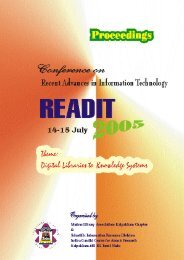READIT-2007 - Indira Gandhi Centre for Atomic Research
READIT-2007 - Indira Gandhi Centre for Atomic Research
READIT-2007 - Indira Gandhi Centre for Atomic Research
You also want an ePaper? Increase the reach of your titles
YUMPU automatically turns print PDFs into web optimized ePapers that Google loves.
Thirdly<br />
Knowledge Management promotes an integrated approach to identifying,<br />
capturing, retrieving, sharing, and evaluating an enterprises in<strong>for</strong>mation asset [8].<br />
These in<strong>for</strong>mation assets may include databases, documents, policies, procedures,<br />
as well as the un-captured tacit expertise and experience stored in individual's<br />
heads." [ 9]<br />
Fourthly<br />
KM may simply be defined as doing what is needed to get the most out of<br />
knowledge resources. In general, Km Focuses on organizing and making available<br />
important knowledge. Km is also related to the concept of intellectual capital.<br />
3. CHARACTERISTICS OF KNOWLEDGE MANAGEMENT IN LIBRARIES<br />
The role of knowledge management in libraries will become more and more<br />
important along with the development of knowledge economy. It is a new<br />
management mode, boasts the following superiority and characteristics incomparable<br />
with conventional management: Human Resource Management Is the Core of<br />
Knowledge Management in Libraries .The most important resource in the knowledge<br />
economy system is the talents who grasp knowledge. The talent competition has<br />
become the focus of market competition in the knowledge economy era. In the<br />
knowledge economy era, the libraries will attach importance to vocational training<br />
and lifelong education of library staffs to raise their scientific knowledge level and<br />
ability of acquiring and innovating knowledge.<br />
They also will and fully respect the human value, guide and bring into play<br />
wisdom potentialities of library staffs, take developing knowledge resources in the<br />
brains of library staffs as an important way <strong>for</strong> rising work efficiency. An all-round<br />
improvement of library staff's quality and positioning of the human value will become<br />
important objectives of knowledge management in libraries. The Objective of<br />
Knowledge Management in Libraries is to Promote Knowledge Innovation<br />
.Knowledge innovation is the core of the knowledge economy society. As bases <strong>for</strong><br />
collection, processing, storage and distribution of knowledge and in<strong>for</strong>mation,<br />
libraries represent an indispensable link in the scientific system chain, an important<br />
link in the knowledge innovation. Secondly, libraries take part in scientific research<br />
process directly. The library work is a component of knowledge innovation. Thirdly,<br />
libraries must pay attention to diffusion and conversion of knowledge. They act as<br />
bridges <strong>for</strong> turning the results of knowledge innovation into realistic productive<br />
<strong>for</strong>ces. Knowledge management in libraries is to promote relationship in and between<br />
libraries, between library and user, to strengthen knowledge internetworking and to<br />
quicken knowledge flow. In the knowledge economy era, libraries will carry out<br />
researches on development and application of in<strong>for</strong>mation resources, construction of<br />
virtual libraries, protection of intellectual property rights in the electronic era etc.,<br />
thus founding the base <strong>for</strong> knowledge innovation .In<strong>for</strong>mation Technology Is a Tool<br />
<strong>for</strong> Knowledge Management in Libraries .Knowledge acquisition is the starting point<br />
of knowledge management in libraries. The application of in<strong>for</strong>mation technologies<br />
enlarges the scope of knowledge acquisition, rises knowledge acquisition speed and<br />
reduces knowledge acquisition cost. It is impossible to accomplish such important<br />
tasks by using man's brains only in the modern society in which the knowledge<br />
changes with each passing day. It will be possible to link closely knowledge sources<br />
and knowledge workers by computer networks, thus constructing knowledge<br />
24

















